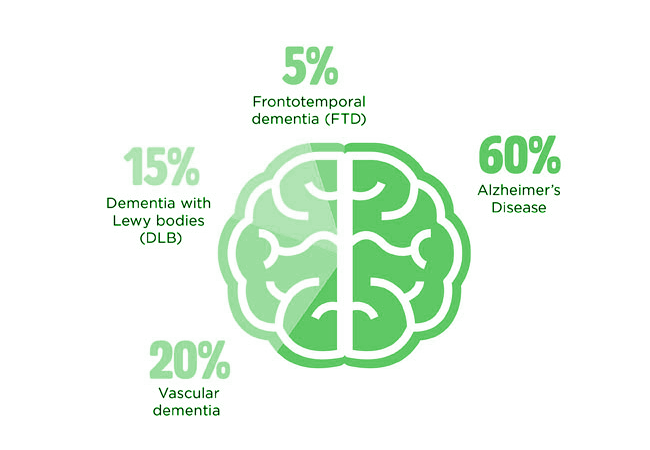What is dementia?
So, what is dementia? Dementia is really any progressive and degenerative condition that leads to decline and destruction of brain function. Most commonly dementia refers to the loss of memory, but it can also lead to progressive difficulty with language, visual-spatial skills, emotional responses, and even motor skills such as walking and eating. Many are confused with the definition of dementia versus Alzheimer’s disease. Alzheimer’s is a very specific disease process with its own unique pathology and represents only one type of dementia. Dementia has several forms and types. For example there is frontal temporal dementia, vascular dementia, Parkinson’s dementia, etc. Alzheimer’s happens to be one of the most common types of dementia. Each of these different types of dementia have their own specific kind of clinical symptoms natural course patterns of behavior, pathology, and in some cases unique treatment options. However, research suggests that using TMS for dementia or Alzheimer’s can boost cognitive function, thereby impacting the course of the disease.
How are different types of dementia different?
Alzheimer’s usually begins with loss of short-term memory. Short term memory is a key and extremely important step for every part of our behavior. Most of us experience some form of short-term memory loss throughout life such as common examples of forgetting where the cars parked or where when left the keys in the house. However, the short-term memory loss seen in the early phases of Alzheimer’s is far more severe and distinct from the common day-to-day short term memory issues we all experience. Most of us for example will remember if we are given clues but patients who have and your degenerative disease such as Alzheimer’s really have a problem with “encoding” of memory. When there are issues with encoding, retrieval fails even with clues so even if you present specific clues or suggestions to recall a specific memory, those who are suffering from Alzheimer’s often have difficulty. Moreover, those who are developing Alzheimer’s show a progressive decline overtime with respect to their memory loss. Normal memory loss does not show progressive decline, or if it does, not nearly as rapid as what is observed in Alzheimer’s.
Contrast the above with frontal temporal dementia in which the beginning stages often show difficulty with social norms of behavior and not so much memory loss. Classically, patients with the behavioral variant of frontal temporal dementia show loss of social skills, making inappropriate gestures or jokes in public, or losing all kinds of inhibitions with respect to cultural norms. Another variant of frontal temporal dementia named semantic variant, patients exhibit loss of language skills, difficulty with finding words, and speaking clearly.
Vascular dementia shows similar signs of cognitive losses Alzheimer’s however there is a pattern of stepwise decline and sudden changes usually due to small silence strokes and Loss of blood flow in several areas of the brain.
Parkinson’s dementia often presents with signs of parkinsonism, such as short-stepped gait, resting hand tremors, production in voice volume, loss of facial expressions. Patients with Parkinson’s type dementia are often referred to as subcortical dementia as it involves libra structures of the brain and less so the top layer of the cortex. Parkinson’s dementia also develops progressive decline in short term memory, but they also exhibit signs of lack of motivation, fatigue, and loss of interest and usual activities.



